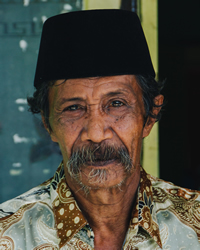Taje, Petapa in Indonesia

Photo Source:
Anonymous
|
Send Joshua Project a map of this people group.
|
| People Name: | Taje, Petapa |
| Country: | Indonesia |
| 10/40 Window: | Yes |
| Population: | 500 |
| World Population: | 500 |
| Primary Language: | Indonesian |
| Primary Religion: | Islam |
| Christian Adherents: | 0.00 % |
| Evangelicals: | 0.00 % |
| Scripture: | Complete Bible |
| Ministry Resources: | Yes |
| Jesus Film: | Yes |
| Audio Recordings: | Yes |
| People Cluster: | Kaili-Tomini of Sulawesi |
| Affinity Bloc: | Malay Peoples |
| Progress Level: |
|
Introduction / History
The Petapa Taje people speak the Taje language (also called Petapa or Tapa), an Austronesian (Celebic, Tomini–Tolitoli) language historically spoken in the villages of Petapa and Tanampedagi on the east coast of Central Sulawesi.
Linguists have documented Taje in sourcebooks and wordlists, and language researchers describe the Taje as one of the small, locally distinct Tomini–Tolitoli speech communities whose traditions tie them to coastal Tomini Bay settlements and to a history of inter-village exchange along the Sulawesi shoreline.
What Are Their Lives Like?
The Petapa Taje live in small coastal and near-coastal villages where daily life has long centered on fishing, smallholder gardening, and local trade with nearby communities, and where kinship and village networks shape social organization.
Because the Taje community is numerically small and geographically localized, many households combine subsistence activities with occasional labor or travel to larger towns for schooling, markets, and services, and younger people commonly use Indonesian or regional Malay for wider communication.
What Are Their Beliefs?
Religious affiliation among the Petapa Taje has been recorded as predominantly Muslim in recent mission and people-group surveys, although local expressions of faith often coexist with customary practices and village rites inherited from earlier generations.
As with many small Sulawesi communities, formal religious identity is layered over local cultural observances, so practices concerning life-cycle events, communal obligations, and customary etiquette may still reflect older village norms alongside Islamic observance.
What Are Their Needs?
Sustainable livelihood options that build on coastal fishing and smallholder agriculture would help families remain economically stable without abandoning village life for permanent out-migration.
Access to education and health services that are sensitive to local language and culture would strengthen the community's long-term resilience while increasing opportunities for youth.
Contextual pastoral resources—such as Scripture portions, audio Scripture and discipleship materials that respect local culture and language—would assist faith communities to grow in ways that are meaningful to Petapa Taje people.
Prayer Points
Pray that God would raise up workers who will lovingly learn the Taje language and culture so that the gospel can be communicated clearly and respectfully.
Pray that the Lord would give the Petapa Taje a hunger for God's Word and that Scripture in formats they can access would transform hearts and families into Christ's likeness.
Pray for sustainable provision for Petapa Taje families so that economic pressure does not force the loss of language and community.
Pray for protection and wisdom for church-planting efforts so that emerging local believers can become mature, indigenous leaders.
Pray that God would heal divisions, bring reconciliation where needed, and build gospel-centred unity within Petapa Taje villages.